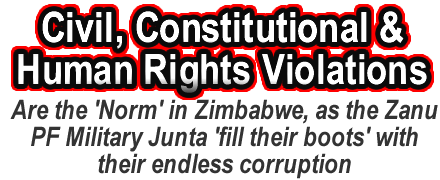Original Article Below:
The Election Observers and their Missions prior to the Elections
European Union
Following the EU election observation methodology, the mission will observe all aspects of the electoral process before, on and after the election day. The EU EOM will issue a preliminary statement and hold a press conference in Harare after the elections. The final report, which will include a set of recommendations for future electoral processes, will be presented and shared with stakeholders after the finalisation of the entire electoral process.
The mission is expected to comprise more than 150 observers from all 27 EU member states, as well as Canada, Norway and Switzerland. An 11-person core team arrived in Harare on 8 July. 46 long-term EU EOM observers arrive in Zimbabwe on 22 July and are deployed to all ten provinces. They observe the electoral process in their areas and report back to the core team in Harare where the observations are analysed.
44 short-term observers will join the mission shortly before the election day. They observe voting, counting and the tabulation of results. The mission will be also joined by a delegation of seven Members of the European Parliament, and diplomatic staff from embassies accredited in Harare. The EU EOM will remain in the country until the completion of the electoral process.
SADC (Southern African Development Community)
I am pleased to inform you that the SADC Electoral Observation Mission to the 2023 Harmonised Elections in the Republic of Zimbabwe consists of 68 personnel. They are from 9 SADC Member States, namely, Republic of Angola, Republic of Botswana, Kingdom of Eswatini, Republic of Malawi, Republic of Mozambique, Republic of Namibia, Republic of South Africa, United Republic of Tanzania, and Republic of Zambia. Our observers have been deployed to the 10 Provinces of Zimbabwe, namely, Harare, Bulawayo, Masvingo, Matabeleland North, Matabeleland South, Midlands, Manicaland, Mashonaland East, Mashonaland Central and Mashonaland West. The SEOM observations will focus on the pre-election, election and post-election periods, which include political parties campaigns; the voting day and the process of the counting of the ballot papers.
To that end, the SEOM has two components, Short- 5 Term Observation (STO) covering the period 10th – 24th August 2023, and Long-Term Observation (LTO), covering the period 25th August – 1st September 2023. We started stakeholder engagements in earnest since our arrival in Harare to appreciate the political, legal and security situation in the context of the elections in order to better inform the Chairperson of the Organ on Politics, Defence and Security Co-operation, His Excellency Hakainde Hichilema, President of the Republic of Zambia
https://www.sadc.int/media-releases-and-statements
Your can read and download the SADC Reports on the election over 23-24th August 2023 Here for their intial findings, then here for their retort to the 'verbal attack' by Zanu PF actors.
The Observer Missions acknowledged the peaceful and calm nature of the pre-election and voting phases during the 23-24 August 2023 Harmonised Elections. However, they identified that certain aspects of the elections did not meet the requirements set by the Constitution of Zimbabwe, the Electoral Act, and the SADC Principles and Guidelines Governing Democratic Elections (2021).
The Missions commended the people of Zimbabwe for maintaining a peaceful political environment throughout the pre-election period and on voting day. They will release a final report after the validation and proclamation of the final results, which will be shared with the Zimbabwe Electoral Commission (ZEC) and all stakeholders.
The long-term observers will continue post-election observation until 1st September 2023, and the SEAC will conduct a post-election review to assess the implementation of recommendations and provide necessary support. In case of electoral disputes, the Missions urged all contestants to follow established legal procedures. They also appealed to political parties, the people of Zimbabwe, and all stakeholders to allow the ZEC to announce the final results as mandated by law.
The African Union Mission
Read or download the African Union report Here
The Mission’s interactions with civic and political actors revealed that concerns persist regarding the process and outcome of the delimitation exercise. These included: allegations of i nadequate consultation with stakeholders despite assertion by the Zimbabwe Electoral Commission that there were consultations at all levels; use of inaccurate population figures; gerrymandering in some areas to produce pre determined election results; and limited civic education on the delimitation.
The Mission takes note of the Commissio n’s efforts to reach out and register as many eligible voters as poss ible. This effort was appreciated by some stakeholders the Mission interacted with but also raised some issues of concern as follows:
- a. That many potential eligible voters were left out due to lack of National Registration Cards which is one of the requirements for registration as a voter. They claimed that the process of obtaining the National Identity cards was not transparent in some areas in the country.
- b. Failure to open the review of the voters roll to political parties as a confidence building measure
- c. The limited time of only five days allocated to voters to check their registration status.
- d. Late release of the voters roll to political parties, candidates and other interested stakeholders
- e. High fees required to be pai d for those wishing to obtain a copy of the voters roll
- f. Limited communication by the Zimbabwe Electoral Commission to its stakeholders regarding the process and state of the voters’ roll
